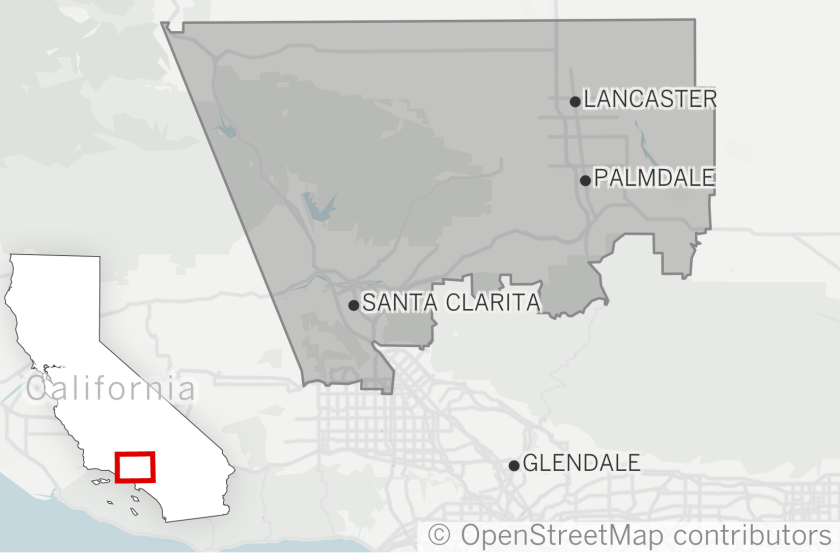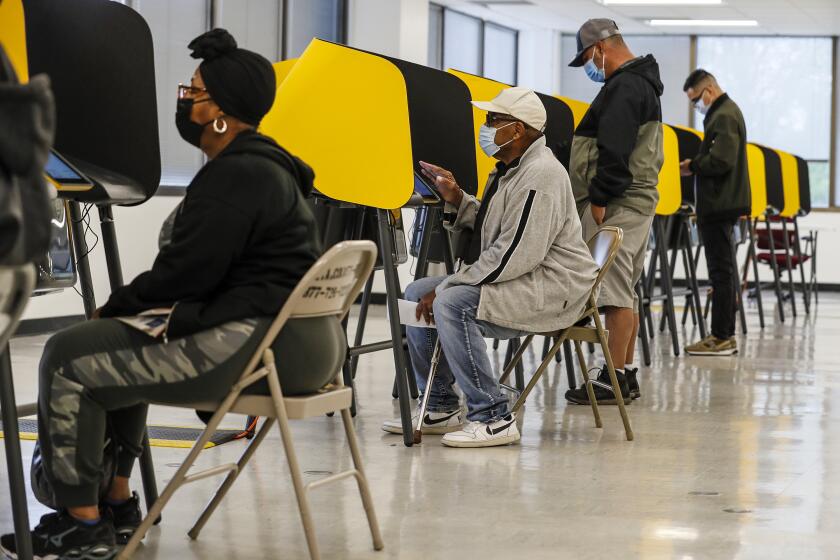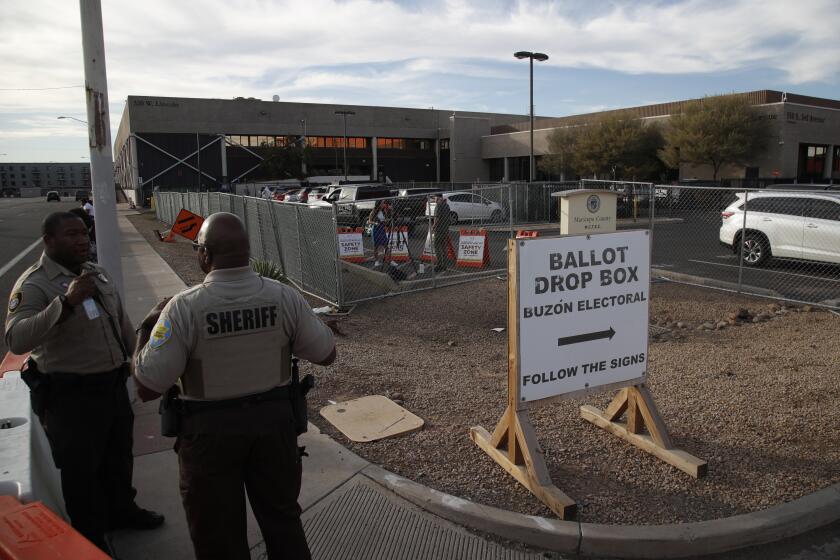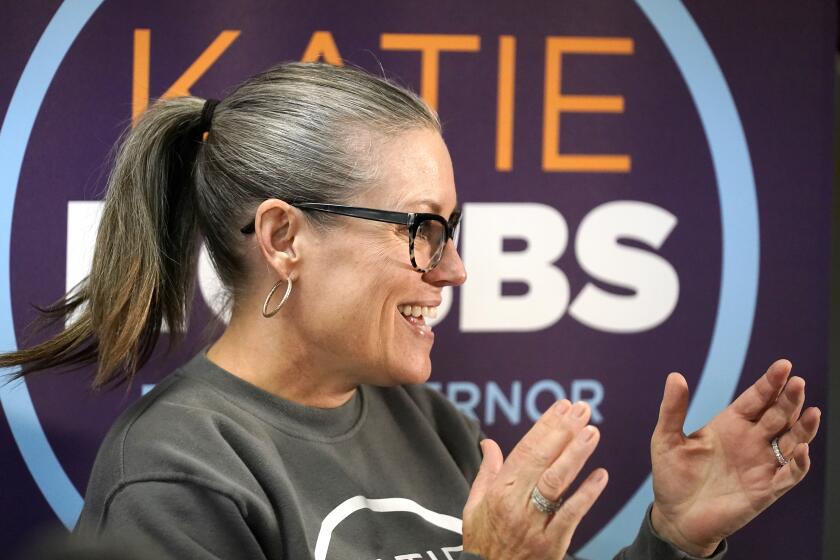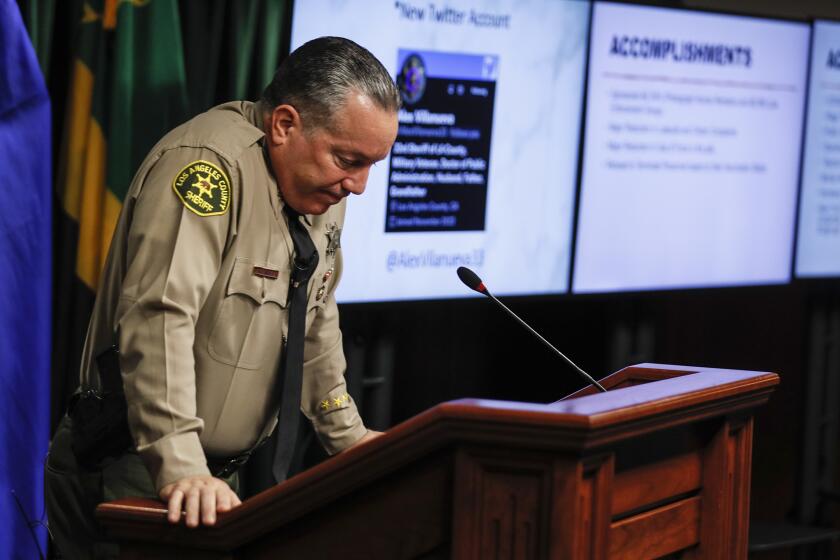Here’s what to watch as results for the midterm elections roll in

- Share via
Election day has finally arrived, and with it, the end of this unsettled campaign season is in sight. That’s not to say the results will come quickly. In fact, in many key races across the country, it could take days or weeks to count ballots — so be wary of any premature declarations of victory.
While the nation waits for polls to close — and then waits and waits some more — here’s a primer on the key questions of this election cycle.
Will there be a ‘red wave’ in the House?
The fundamentals of this election have always been in Republicans’ favor. Historical precedent is not kind to the party that occupies the White House during a midterm election and stubborn inflation and President Biden’s lackluster approval ratings haven’t done the Democrats any favors. In recent weeks, polls show these economic concerns are top of mind, especially for crucial independent voters.
Republicans only need five seats to win the House majority and most projections have them easily clearing that bar, with estimates ranging from 12 to 30 pickups. Whether this qualifies as a “red wave” will come down to the margins — a House chamber with a narrow Republican majority will have a far different tone than one dominated by the GOP. Republicans are even competing in districts where Biden beat President Trump by double digits, such as Rep. Katie Porter’s Orange County seat.
Poor performance in blue states is a bleak sign for Democrats, although some of their incumbents in swing or red states are holding their own in polling — which may help them avoid a bigger wipeout. A true wave would wipe out these vulnerable Democrats as well.
In the November midterm election, California is one of the battlefields as Democrats and Republicans fight over control of Congress.
Will the tide turn in the Senate?
Democrats have virtually no room for error to maintain their control of the Senate, and their most vulnerable incumbents are locked in tight races based on public polling. But the party’s prospects are better than they are in the House, largely because Senate races tend to be more shaped by individual candidates than national dynamics.
Who is running for California governor? What are the propositions on the ballot? Here is your guide to the 2022 midterm election.
Over the summer, GOP Senate Leader Mitch McConnell downplayed expectations that his party would win back the chamber, citing “candidate quality.” Some Republican contenders in the most competitive races made it through their primary with the power of Trump’s endorsement, even if they did not have the broadest appeal to the general electorate. Candidates such as Blake Masters in Arizona and Don Bolduc in New Hampshire were seen as relatively weak candidates to take on their state’s otherwise vulnerable incumbents, Sens. Mark Kelly and Maggie Hassan.
But political gravity still has pull and the Arizona and New Hampshire races have tightened. The GOP is particularly hopeful that Nevada Sen. Catherine Cortez Masto will fall to Adam Laxalt, the Republican former state attorney general, and that football star Herschel Walker will oust Georgia Sen. Raphael Warnock. There’s a possibility Georgia voters would have to go to the polls again on Dec. 6 if neither Walker nor Warnock gets more than 50% of the vote; a run-off is required under state law if no candidate gets a majority.
Democrats have some pick-up opportunities as well, most notably in Pennsylvania. Their candidate, Lt. Gov. John Fetterman, is squaring off against Mehmet Oz, the well-known television doctor. Oz’s popularity took a beating during a rough GOP primary, but Fetterman’s candidacy was hobbled by a serious stroke, which he continues to recover from.
Who will be the governors in the 2024 battlegrounds?
Every major battleground state is holding governor’s races this year, with ripple effects that could be felt in the 2024 presidential race. Trump acolytes such as Kari Lake in Arizona and Doug Mastriano in Pennsylvania have refused to accept the results of the 2020 presidential race, raising questions of whether they would respect the outcome of future elections. While Mastriano, a GOP state legislator, has trailed substantially in polling behind Democratic state Atty. Gen. Josh Shapiro, Lake, a former newscaster, has had a much stronger showing against Katie Hobbs, Arizona’s current secretary of state.
Let us know how your in-person voting experience in California went and what issues you faced when you went to the polls.
In the upper Midwest, Democrats Gretchen Whitmer of Michigan and Tony Evers of Wisconsin are trying to fend off challenges from Trump-backed candidates Tudor Dixon and Tim Michels, respectively. Whitmer’s race in particular could have big implications for a rising star of the party. And speaking of rising stars, Florida Gov. Ron DeSantis is favored to easily beat Democrat Charlie Crist, but an especially large margin of victory could help play into a potential 2024 bid.
What does this mean for how we conduct elections?
Secretary of state races are usually sleepy affairs, but Trump’s persistent lies about election fraud have put new light on this position. Several GOP election deniers are running in battlegrounds, such as Mark Finchem in Arizona and Jim Marchant in Nevada. Their vows to overhaul election administration could upend the presidential race in key states.
Despite pushes by conspiracy theorists and far-right groups to discredit the electoral process, Arizona election officials have expressed optimism and pride in the work they’ve done leading up to Tuesday.
If these candidates win, the implications could be vast. Republicans have been trying to curtail early voting and mail ballots, a voting method that was once predominantly used by GOP voters until Trump complained about alleged election fraud. Some of the most prominent election denier candidates, citing baseless voting machine conspiracies, have also called for lengthy hand counts of ballots, which experts say could lead to delayed and inaccurate tallies. Others have said they would not have upheld the results of the 2020 election, calling into doubt if they would certify races in the future.
More to Read
Get the L.A. Times Politics newsletter
Deeply reported insights into legislation, politics and policy from Sacramento, Washington and beyond. In your inbox twice per week.
You may occasionally receive promotional content from the Los Angeles Times.
